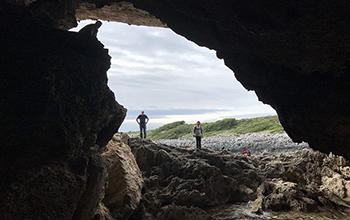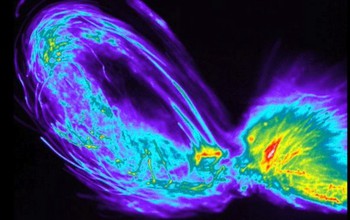搜索结果: 1-12 共查到“海洋科学 2.8 million”相关记录12条 . 查询时间(0.078 秒)

Geoscientists reconstruct 6.5 million years of sea level in the Western Mediterranean(图)
Geoscientists reconstruct 6.5 million years sea level Western Mediterranean
2021/2/5
The pressing concern posed by rising sea levels has created a need for scientists to predict how quickly the oceans will rise in coming centuries, researchers say. To gain insight into future ice shee...

Deep sea microbes dormant for 100 million years are hungry and ready to multiply(图)
Deep sea microbes dormant 100 million years hungry ready to multiply
2020/7/31
For decades, scientists have gathered ancient sediment samples from below the seafloor to better understand past climates, plate tectonics and the deep marine ecosystem. In a new study published in...

Microplastics million times more abundant in the ocean than previously thought(图)
Microplastics million times more abundant ocean previously thought
2019/12/20
Nothing seems safe from plastic contamination. A new study by NSF-funded researchers at the Scripps Institution of Oceanography suggests there could be a million times more pieces of plastic in the oc...

Mass extinction of land and sea biodiversity 250 million years ago not simultaneous(图)
Mass extinction land sea biodiversity 250 million years ago simultaneous
2019/12/13
Some 250 million years ago, simultaneous mass extinctions of marine and terrestrial life occurred in an event known as the End-Permian. Or so scientists believed.New research led by Colby College geol...

Crabs, lobsters and shrimp now have a family tree dating 500 million years(图)
Crabs lobsters shrimp family tree dating 500 million years
2019/10/30
Researchers have for the first time traced the roots of crabs, lobsters and shrimp to create the family tree of crustaceans people love to eat.The tree shows the 450-million-year evolution of these 10...

Tectonic collision 50 million years ago led to widespread ocean changes(图)
Tectonic collision 50 million years ago widespread ocean changes
2019/11/22
When the landmass that today is the Indian subcontinent slammed into Asia some 50 million years ago, the collision changed the configuration of the continents and altered global climate.Now a team of ...

NSF awards $2.8 million grant to develop advanced ocean and atmosphere simulator(图)
NSF $2.8 million advanced ocean and atmosphere simulator
2017/11/24
Can Earth's complex ocean-atmosphere system be mimicked in a laboratory? The National Science Foundation (NSF) has awarded $2.8 million to the Scripps Institution of Oceanography (SIO) in La Jolla, Ca...
NSF awards $5.3 million in 59 grants to study effects of recent hurricanes
NSF awards $5.3 million 59 grants recent hurricanes
2017/10/25
It was August 25, and Hurricane Harvey's intensifying winds were moving onshore in South Texas, bringing torrential rains. No one yet knew that Harvey would eventually swamp Houston in flood waters. N...
NSF awards $13 million in third set of coastal sustainability grants
NSF $13 million third set coastal sustainability grants
2016/9/29
At a time when sea-level rise is flooding cities in the U.S. Southeast, harmful algae blooms are threatening seashore communities, and climate change is affecting fisheries just offshore, how do we co...
Biotic Response to Global Change: The Last 145 Million Years
145 Million Years Global Change
2015/7/31
This volume has its origins in a joint research program between the Natural History Museum, London and University College, London on Global Change and the Biosphere. The authors are mainly paleontolog...
A 180-Million-Year Record of Sea Level and Ice Volume Variations from Continental Margin and Deep-Sea Isotopic Records
180-Million-Year Record Sea Level and Ice Volume Variations Continental Margin Deep-Sea Isotopic Records
2015/7/9
The geologic record provides constraints on the rates, amplitudes, and mechanisms controlling globally averaged (eustatic) and relative (eustatic plus subsidence/uplift) changes of sea level on variou...
Oceans may be acidifying faster today than in the past 300 million years
Oceans 300 million years
2014/9/12
With increasing levels of carbon dioxide accumulating in the atmosphere and moving into marine ecosystems, the world's oceans are becoming more acidic.

